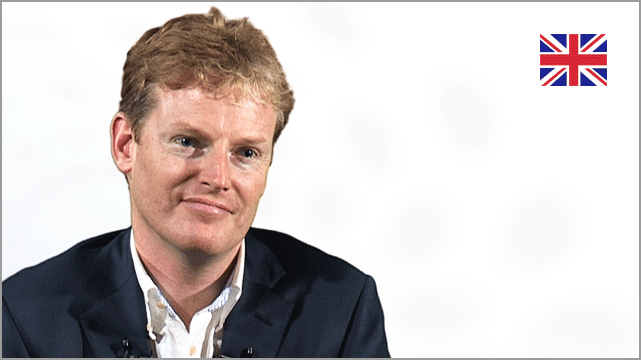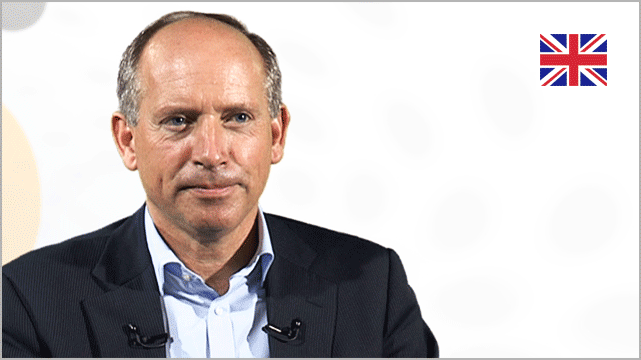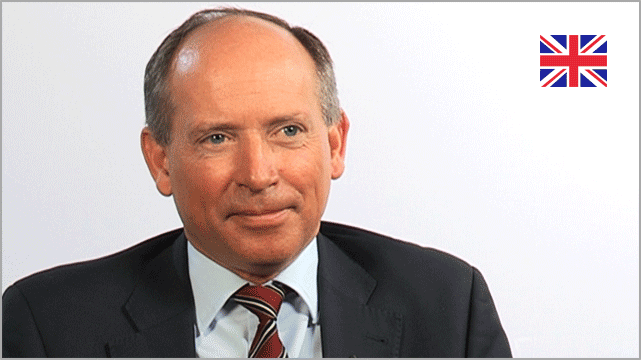EuroBusiness Media (EBM): Kingfisher, the international home improvement retailer, has just reported interim results. We’re talking now to Kingfisher’s CEO, Ian Cheshire. Ian welcome. Kingfisher has produced what appears to be a good set of results in tough economic conditions. What are the key drivers behind the numbers?
Ian Cheshire: Well, I think we have really seen two important themes in the first half, which have led to this 24% increase in profits, which is a great result. Firstly, consistent forms across all three divisions, so everyone has contributed to this performance. Obviously, the strongest in France, but also the UK and international, so across-the-board improvement. Secondly, what we have seen is that it’s really been about self-help, because, with the exception possibly of France where we have seen a slightly more buoyant market, really most of the markets have been flat or, in the case of the UK, negative. So what we’ve been doing is focusing on our product range, looking at our margins, really working on the costs. And it’s that heads-down, self-help attitude that has allowed us to produce these numbers.
EBM: So let’s look at France in more detail now. The business there has done well with a 24% increase in profits. What are your comments on the performance of the French business?
Ian Cheshire: I think in the first half in France we saw a slightly more positive market, actually more positive in France than it was in the UK. So there was growth in France in the market, but we comfortably outperformed. And I think what we have in France are really two different dynamics. Firstly, with Castorama, we have seen continued top-line growth coming from product innovation and store revamp. And that is, I think, a theme that has got some years yet to play out. Secondly, and really encouragingly, we saw a really good first half performance from Brico Dépôt, who I think have got back to basics and then really worked on their ranges and are seeing the benefits of that. And probably, to be fair, a little bit of a rebound in the construction market, which has continued to pick up in France. But it’s very difficult at this stage, after six months, to read what the second half will be. So we’re not making any projections into how the second half of 2011 might go.
EBM: The UK performance doesn’t look quite as good. Is that to do with the economy or is it to do with other factors?
Ian Cheshire: I think the UK market has been generally challenging in the first half of this year. We had some very odd weather patterns, some great early weather and some very poor second quarter weather, which meant that a lot of our seasonal goods had a very good start and a very difficult finish. So that was definitely one big factor for us. Secondly, the overall market was hit by disruption as we saw the number 4 competitor, Focus, go bust and leave the market. There was a big stock clearance, in fact, which definitely had an impact on us in that quarter. And then the final bit, I would say, is that we have seen generally harsher market conditions: people are more squeezed in terms of disposable income in the UK, it appears, than possibly in some of the other European countries. So our business has done really well to turn in, despite a top line challenge, a bottom line profit. B&Q has made a 6% profit growth, most of its competitors have actually seen profits go backwards. And Screwfix, by contrast, has carried on growing and grown profits significantly in the first half. So, again, difficult environment, great performance.
EBM: What about plans for growth in the UK?
Ian Cheshire: Our plans for the UK are actually very positive. Given some of the public comment about the negative outlook in the UK, we are actually moving ahead, partly because we have the balance sheet strength to do it, and partly because we believe in the long-term future of our brands. So there are really two main axes for development in the UK that we have announced recently. Firstly, we bought 28, or it seems to be 29, of the Focus stores that were in administration. We’ll open all of those by the end of October and we’ll invest significantly and, in the process, create over 700 jobs. In the other key UK operation, which is Screwfix, we have learned a lot in the last six months about how to take our format into smaller footprint and, therefore, allow us to get into more sites than we could possibly go before. So, today we’ve announced a big expansion of Screwfix, an acceleration of its expansion, which in turn will create a further 1,000 jobs in the second half. And overall in the UK, combined with our property investments, we are talking about over £130 million of investment in the UK – a significant increase on last year – because we think we have the position in which we can invest.
EBM: Turning to your business outside of the UK and France, the performance in Eastern Europe looks good, but B&Q China is still loss making. How is the repositioning plan in China going?
Ian Cheshire: B&Q China is still very much on track on our first element of our plan, which is to fix the existing losses and the losses have halved year-on-year. So we remain on good track, I think, for the end of the year when we should be achieving a break-even business. Obviously, the markets will be up and down, particularly in China, on the back of housing markets. So we’ve seen a 14% decline, or even more in some of the housing markets, and we’re very dependent on new housing markets in China in a way that’s not true, say, in Europe. So there have been some headwinds for the business, but I think the underlying cost position has been improved, and we are actually in good shape for break-even. And we’re now thinking about where we go going forward with China.
EBM: You're coming to the end of your plan, which is called Delivering Value, which was announced back in 2008 and is due to complete in January next year. Can you give us a progress update on the plan?
Ian Cheshire: The Delivering Value plan has seven points, and I think if I gave a progress report for each of the seven, I’d be here for about three hours. But if I could pick out the main themes there, firstly, I think we have seen continued progress on all seven. We have probably had more challenge this first half of 2011 around our working capital, which has been an area where we made a huge amount of progress over the last three years. But we have had a tougher period. We’ve probably had around £60 million of stock in the business in the first half than we originally thought. We need to get on to that for the second half. But despite that, and possibly of less good performance there, all the other indicators on Delivering Value, I think, have been overachieved again in the first half of 2011. But we have got six months left to run and we need to focus on getting over that finishing line.
EBM: In March, you outlined the next phase of your strategy, called "Creating the Leader". What progress has been made here?
Ian Cheshire: Well, the next phase of our growth agenda is called “Creating the Leader” because we are beginning to bring the business together in a different way to unlock the next level of potential in Kingfisher, particularly around creating single common best ranges of products. Now, to do that, you can’t do that overnight, you need to prepare for it, you need to get ready, you need to mobilise. So what we are doing this year is really doing the planning and the mobilisation, so things like “When do we change product ranges?” – you cant just show up in two years’ time and say, “We’re going to change it” – you have to plan for it now. And we’ve brought together the brands, the common own label brands across the group into twelve super brands. And as a result, we are now ready to get into next year, when the real volumes start to hit. So, this has been very much a year of getting ready. We set out the main agenda for “Creating the Leader”. We will fill in some of the detail and the Key Performance Indicators (KPIs) early next year.
EBM: You mentioned plans for a common core product range across the Group. In theory, this opportunity has been there for Kingfisher for a while. Why do you think you can deliver on it now?
Ian Cheshire: We currently start at Kingfisher with a lot of similar ranges, but only 1% of our product range is probably truly identical. So we have a great opportunity. When you estimate that there is a potential – and there is a potential over several years – to reach maybe 50% common range, with all the economics and the better purchasing power that that implies, I’m not sure we could have done that common range project before. We had to arrange, I think, two or three things to get them lined up before we could actually go into this next phase. Firstly, we had to have, for example in France, a national range. Until 5 years ago it was still very decentralised, so you couldn’t bring in common range when you didn’t even have common range inside France. Secondly, we had to get our own label strategy aligned. We had to have common own labels, and that took a bit of time to get ready for. And finally, we had to have a global sourcing network, which we have developed over several years, but has now become truly international and can now find the best sources of products. So, by aligning the national ranges, getting a common own label approach and finally increasing investment in our sourcing network, we can really make the next step, and that’s now the journey for the next three to five years.
EBM: And finally, how do you see the outlook, particularly here in the UK? Are you in the double dip camp?
Ian Cheshire: I think that the only thing you can say about the consumer environment at the moment is that it’s extremely uncertain. We’ve got a major Eurozone potential crisis. We’ve got weakness in the US. And by contrast, places like China or India grow. So the overall world economy could still be in good shape, but you can see individual crisis points. We have assumed no real help from the market. We’ve had a bit of help in France in the first half, but we’re not counting on much, pretty well anywhere in Europe. So what we’re about for the next six months is self-help, work on our products, work on our costs, work on our margins, and actually I think there’s a lot more to come for that. So we have to get our heads down and do what we can do, because the outside world will be, I think, pretty difficult.
EBM: Ian Cheshire, CEO of Kingfisher, thank you very much.
Ian Cheshire: Thanks very much.




